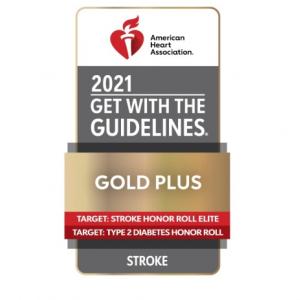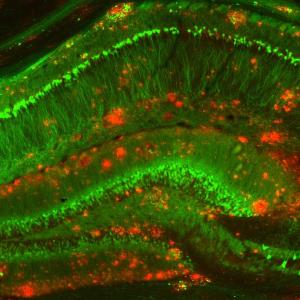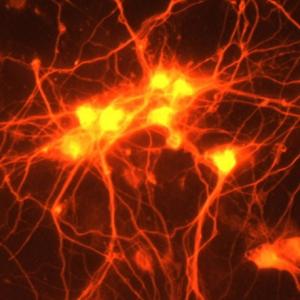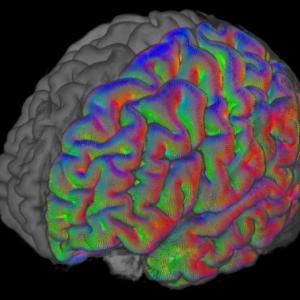Faculty Spotlight: Jody Feld, DPT, PhD
Jody Feld, DPT, PhD, had her first exposure to physical therapy after a childhood athletic injury. She decided to pursue physical therapy herself, ultimately specializing in neurologic rehabilitation. Now she’s at Duke, where she’s mentoring students in our DPT program and conducting research on reducing disability, falls and sedentary behavior among adults with neurologic conditions.
Duke hospitals receive AHA’s top award for comprehensive stroke care
Duke University Hospital and Duke Raleigh Hospitals have received the American Heart Association’s (AHA) Get With The Guidelines®-Stroke 2021 Gold Plus Quality Achievement Award. This award, the highest that the AHA offers, recognizes commitment to providing the best possible care for stroke. Both Duke University Hospital and Duke Raleigh Hospital have received this award from the AHA for the past three years.
Fellow Spotlight: Shraddha Patel, MD
Shraddha Patel, MD, came to neurology gradually as a medical student, treating both acute neurological crises in her hospital’s emergency department as well as chronic conditions in the outpatient setting. Now, she’s completing her specialty training at Duke as one of our newest vascular neurology fellows. In this week’s “Spotlight” interview, Patel talks to us about her experiences as a fellow so far, her career plans for a future in stroke or hospital neurology, and her hopes for traveling and reuniting with family once the COVID-19 pandemic is under control.
Duke Neurology Research Round Up, August 2021
This July, new research from the Duke Neurology Department answered questions about the subcellular origins of itching, how COVID-19 is affecting people with amyotrophic lateral sclerosis, what factors influence people eligible for epilepsy surgery to move forward with the procedure and topics. The paragraphs below summarize the 11 articles appearing in peer-reviewed publications from our faculty, staff, and trainees. Check them out and find links to the original publications below.
Neuromuscular Disease
APP Spotlight: Kimberly Holzmacher, MSN, AGPCNP-BC
An eight-hour shift can be exhausting on its own, but for Kimberly Holzmacher, MSN, AGPCNP-BC, her workday is only getting started. As one of our newest advanced practice providers (APPs), Holzmacher typically starts work on our Stroke Service before 5 a.m. and often works until 8 p.m. or later. For this week’s “Spotlight” interview, Holzmacher talks about why she’s been drawn to helping patients with stroke since nursing school, how this work compares to working in the Preston Robert Tisch Brain Tumor Center, and the joys and difficulties of her job.
Duke Neurology Research Round Up, July 2021
New publications written by members of the Duke Neurology Department published this June advanced our understanding of the origins of Alzheimer’s disease, stroke, and spinal injuries, as well as offering new insights on how to better diagnose and treat these and other conditions. Our faculty contributed to recent articles in Lancet Neurology, Stroke, and other high-impact journals. Read more about each of these stories, and find links to the original articles themselves, in the paragraphs below.
Neuromuscular Disease
Faculty Spotlight: Xiaoning Jiang, PhD
At North Carolina State University, Xiaoning Jiang, PhD, leads the Micro/Nano Engineering Lab (MNEL), which performs research on smart materials, smart structures, micro- and nano-fabrications, micro- and nano-devices, and their applications in biomedical, mechanical and aerospace engineering. Jiang also recently joined the Duke Neurology Department, where he’ll be applying his expertise in advanced ultrasound transducers to improve biomedical imaging, therapy, and drug delivery for stroke.
Duke Neurology Research Round Up, June 2021
Members of the Duke Neurology Department did their part for Stroke Awareness Month, contributing to eight new peer-reviewed studies published this May. But our other divisions didn’t hold back either, with thirteen other articles advancing our understanding of neuro-oncology, multiple sclerosis, headache, and other subjects.
Read about each of the studies published from members of the Duke Neurology Department below, and find links to the original journal articles as well.
Stroke
Duke Neurology Research Round Up, May 2021
Members of the Duke Neurology Department advanced the fields of clinical, translational, and basic neuroscience this April with 14 new peer-reviewed studies. Nicole Calakos, MD, PhD, was the senior author of a new study in Science that expands our understanding of the integrated stress response in the brain and how it influences learning and memory.
Eye strokes: Earlier ED referral can reduce impact of sudden vision loss
A recent study led by Duke vascular neurologist Brian Mac Grory, MB, BCh, BAO, examined treatment for central retinal artery occlusion (CRAO or “eye stroke”)—a rare type of stroke characterized by the sudden onset of painless, usually permanent vision loss in one eye.
Mac Grory notes that while most strokes present with weakness, facial droop or difficulty speaking, eye strokes are hard to recognize and treat in a timely manner because the only symptom may be sudden blindness in one eye.








